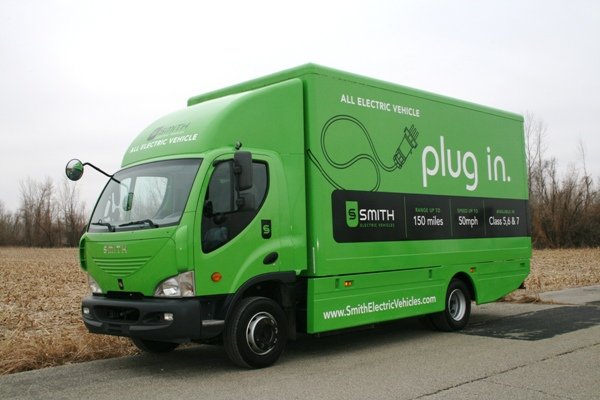Smith Electric Vehicles US buys UK parent
According to Reuters Smith Electric Vehicles U.S. (SEV) just bought a majority interest in its United Kingdom based parent. Essentially, this makes the company U.S. based. Considering the state of the budding electric vehicle (EV) market in the U.S., this seems to be a timely proposition.
As much press as the Nissan LEAF and Chevrolet Volt have received these past several months, almost invisible has been the development on the commercial vehicle side of the business. As far back as July, when President Obama held a press conference at the SEV plant in Kansas City, Missouri, there has been discussion regarding this movement. That same month, SEV announced that AT&T, Coca-Cola, Frito-Lay, Pacific Gas & Electric Company (PG&E), and Staples had placed orders for their electric trucks. And real trucks they are.
SEV UK has been producing commercial electric vehicles since 1920. In London, they were particularly known for what were referred to as “milk floats” – electric trucks that delivered milk in the early morning hours to London’s multitudes. As the need developed, increasingly heavier duty applications were called for in other applications, and current SEV products expanded to offer a payload of as much as eight tons. Electric vehicles make particularly good sense as a replacement to diesel vehicles in city-based delivery route applications with their constant starts, stops and low-speed operation, although the vehicles are highway compatible with a 50 mile per hour capacity.
AT&T has made a significant commitment to alternative-fuel vehicles. 15,000 of AT&T’s commercial fleet of 75,900 vehicles will be replaced with compressed natural gas (CNG), hybrid-electric vehicles, and now full electric vehicles by 2018. Without doubt, the LEAF could serve a role as a customer service vehicle in this fleet.
Coca-Cola, already a leader in transitioning to an alternative-fuel powered fleet, is also looking to place full electric trucks into its fleet, initially in New York and Washington, D.C.
Frito-Lay, the snack subsidiary of PepsiCo, planned to place 21 electric trucks into operation in the U.S. and Canada in 2010. By the end of this year the goal is 155 more, making Frito-Lay the largest commercial fleet of all-electric trucks in North America. Eventually half of their 4,000 medium-duty trucks could be all-electric.
PG&E will be using a combination of different kinds of electric trucks in its fleet. In July, PG&E announced an agreement to take delivery of extended range electric trucks, similar in operating design to that of the Volt – operating pure electric for 30-40 miles with an on-board gas engine providing further range if needed. In addition, PG&E worked with SEV to produce an all electric utility “bucket truck”, which has been incorporated into its fleet with more on the way.
Staples will place 41 class six electric trucks in operation in California, Missouri and Ohio. From Staples press release:
“The addition of these all-electric delivery trucks is the latest example of our commitment to continually improve our delivery fleet and its impact on the environment,” said Mike Payette, manager of fleet equipment at Staples. “Over time, we’ll look to increase the number of these trucks in the Staples fleet as an effective way to service our delivery customers while reducing our carbon emissions.”
Not only are commercial ventures looking to move in the EV direction. The U.S. Marine Corps has also made the move, with trucks due to arrive at Camp Pendleton, California by February. The Marines have a stated goal of being 25% reliant on renewable energy by 2025. Of all of our government’s agencies, we give the Marines the best odds of meeting this goal.
The question is, if all of the nay-sayers are correct about electric vehicles not making sense, why are all of these entities embracing the technology? Simple. It makes good business sense.
This from the Wall Street Journal:
“We’re a business here,” said Mike Payette, vice president of fleet services for Staples, a Framingham, Mass.-based office-supply company. “They have to justify themselves. They have to prove themselves and pull their own weight.”
Staples is spending $90,000 for each truck compared to the $60,000 cost of the diesel truck that they would otherwise be buying. With an expected usable life of ten years, Staples will make back the additional investment in 3.3 years, and come out $60,000 ahead over ten years. Referenced in the article are all of the cost savings offered by the electric truck, most of which will also apply to the LEAF owner. Also, all of these cost savings are based on the current cost of fuel – be it diesel or gasoline. When the price of these fuels goes up, the cost savings will increase.
In a nutshell (although this was a particularly large nut), companies are transitioning to EVs for the same reasons that individuals are: it makes financial sense, and it is good for the environment. We see continued movement in this direction as these vehicles are seen in operation – both private EVs and corporate EVs.
 On a side note – you may have noticed the byline change above. When I first started publishing Living LEAF, my primary means of communicating online was via various fora. My nom de plume was (and continues to be) LEAFguy. I never meant for my real name to go unpublished, as I have that information in my “About” page above. I think it’s time, with the advent of the new year, to take ownership of my blog, under my own name. The byline will continue to read “Ernie Hernandez – LEAFguy” until I decide to drop the LEAFguy at some point. Thank you for your continued support.
On a side note – you may have noticed the byline change above. When I first started publishing Living LEAF, my primary means of communicating online was via various fora. My nom de plume was (and continues to be) LEAFguy. I never meant for my real name to go unpublished, as I have that information in my “About” page above. I think it’s time, with the advent of the new year, to take ownership of my blog, under my own name. The byline will continue to read “Ernie Hernandez – LEAFguy” until I decide to drop the LEAFguy at some point. Thank you for your continued support.



